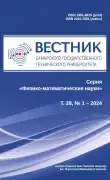Неявная итерационная схема на основе алгоритма псевдообращения и её применения
- Авторы: Жданов А.И.1,2, Сидоров Ю.В.1
-
Учреждения:
- Самарский государственный технический университет
- Филиал ФГБОУ ВО «СамГТУ» в г. Новокуйбышевске
- Выпуск: Том 28, № 1 (2024)
- Страницы: 117-129
- Раздел: Математическое моделирование, численные методы и комплексы программ
- URL: https://bakhtiniada.ru/1991-8615/article/view/311011
- DOI: https://doi.org/10.14498/vsgtu2026
- EDN: https://elibrary.ru/HIGWRZ
- ID: 311011
Цитировать
Полный текст
Аннотация
Предложена новая версия неявной итерационной схемы, для реализации которой требуются лишь матрично-векторные вычислительные процедуры. Это делает предлагаемую вычислительную схему потенциально высокоэффективной для решения широкого класса задач большой размерности на современных высокопроизводительных вычислительных платформах, например Nvidia Cuda. Показано, что предлагаемые алгоритмы могут быть использованы для решения плохо обусловленных линейных систем и задач наименьших квадратов, а также для построения итерационных алгоритмов регуляризации. Приводятся результаты вычислительных экспериментов, подтверждающие эффективность предлагаемых вычислительных алгоритмов.
Полный текст
Открыть статью на сайте журналаОб авторах
Александр Иванович Жданов
Самарский государственный технический университет; Филиал ФГБОУ ВО «СамГТУ» в г. Новокуйбышевске
Автор, ответственный за переписку.
Email: zhdanovaleksan@yandex.ru
ORCID iD: 0000-0001-6082-9097
https://www.mathnet.ru/person41724
доктор физико-математических наук, профессор; профессор; каф. прикладной математики и информатики; профессор; каф. электроэнергетики, электротехники и автоматизации технологии процессов
Россия, 443100, Самара, ул. Молодогвардейская, 244; 446200, Новокуйбышевск, ул. Миронова, 5Юрий Вячеславович Сидоров
Самарский государственный технический университет
Email: linuxboy2007@gmail.com
ORCID iD: 0000-0002-8138-9200
https://www.mathnet.ru/person114787
кандидат физико-математических наук; доцент; каф. прикладной математики и информатики
Россия, 443100, Самара, ул. Молодогвардейская, 244Список литературы
- Sun L.,Wei Y., Zhou J. On an iterative method for solving the least squares problem of rankdeficient systems // Int. J. Comp. Math., 2015. vol. 92, no. 3. pp. 532–541. DOI: https://doi.org/10.1080/00207160.2014.900173.
- Zhdanov A. I. Implicit iterative schemes based on singular decomposition and regularizing algorithms // Vestn. Samar. Gos. Tekhn. Univ., Ser. Fiz.-Mat. Nauki [J. Samara State Tech. Univ., Ser. Phys. Math. Sci.], 2018. vol. 22, no. 3. pp. 549–556. EDN: PJITAX. DOI: https://doi.org/10.14498/vsgtu1592.
- Жданов А. И. Неявная итерационная схема на основе расширенных линейных систем // Докл. РАН. Матем., информ., проц. упр., 2022. Т. 503. С. 91–94. EDN: COMJBF. DOI: https://doi.org/10.31857/S2686954322020205.
- Ben–Israel A., Greville T. N. E. Generalized Inverses: Theory and Applications. New York: Springer, 2003. xv+420 pp. DOI: https://doi.org/10.1007/b97366.
- Riley J. D. Solving systems of linear equations with a positive definite, symmetric, but possibly ill-conditioned matrix // Math. Comp., 1955. vol. 9. pp. 96–101. DOI: https://doi.org/10.1090/S0025-5718-1955-0074915-1.
- Esmaeili H., Erfanifar R., Rashidi M. An efficient Schulz-type method to compute the Moore–Penrose inverse // Int. J. Industr. Math., 2018. vol. 10, no. 2. pp. 221–228.
- Toutounian F., Soleymani F. An iterative method for computing the approximate inverse of a square matrix and the Moore–Penrose inverse of a non-square matrix // Appl. Math. Comp., 2013. vol. 224. pp. 671–680. DOI: https://doi.org/10.1016/j.amc.2013.08.086.
- Golub G. H. van Loan C. F. Matrix Computations. Baltimore: Johns Hopkins Univ., 2013. xxiv+756 pp.
- Schulz G. Iterative Berechung der reziproken Matrix // ZAMM, 1933. vol. 13, no. 1. pp. 57–59. DOI: https://doi.org/10.1002/zamm.19330130111.
- Hansen P. C. REGULARIZATION TOOLS: A Matlab package for analysis and solution of discrete ill-posed problems // Numer. Algor., 1994. vol. 6. pp. 1–53. DOI: https://doi.org/10.1007/BF02149761.
- Pillonetto G., Chen T., Chiuso A., et al. Regularized System Identification: Learning Dynamic Models from Data. Cham: Springer, 2022. xxiv+377 pp. DOI: https://doi.org/10.1007/978-3-030-95860-2.
- Wang E., Zhang Q., Shen B. et al. Intel math kernel library / High-Performance Computing on the Intel® Xeon Phi™. Cham: Springer, 2014. pp. 167–188. DOI: https://doi.org/10.1007/978-3-319-06486-4_7.
- Fatica M. CUDA toolkit and libraries / 2008 IEEE Hot Chips 20 Symposium (24–26 August 2008). Stanford, CA, USA, 2008. pp. 1–22. DOI: https://doi.org/10.1109/HOTCHIPS.2008.7476520.
- Zare H., Hajarian M. Determination of regularization parameter via solving a multiobjective optimization problem // Appl. Num. Math., 2020. vol. 156. pp. 542–554. DOI: https://doi.org/10.1016/j.apnum.2020.05.021.
Дополнительные файлы








